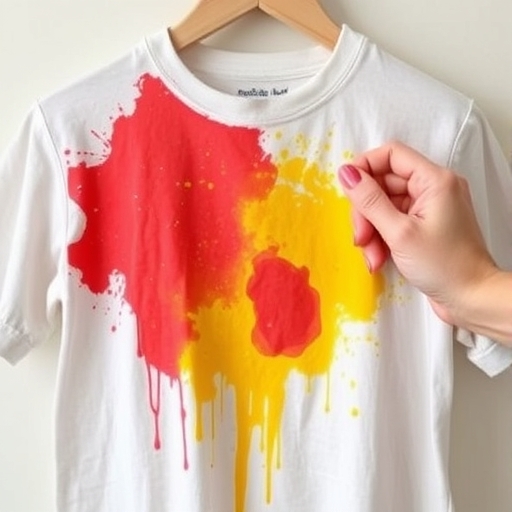How to Remove Acrylic Paint From Clothes
Acrylic paint is a popular medium for artists and crafters alike due to its versatility, quick drying time, and vibrant colors. However, this can lead to unfortunate accidents, leaving you with paint stains on your favorite clothes. If you find yourself in this predicament, don’t despair. This article will guide you through the process of removing acrylic paint from clothes effectively and safely.
Understanding Acrylic Paint
Before diving into removal techniques, it’s essential to understand what acrylic paint is. Acrylic paint is a water-based paint that contains pigments suspended in an acrylic polymer emulsion. It is known for its durability and resistance to fading, which can make it challenging to remove once it dries.
Why is Acrylic Paint Difficult to Remove?
- Fast Drying: Acrylic paint dries quickly, making it easier to set into fabrics.
- Water-Resistant: Once dry, acrylic paint becomes water-resistant, making it harder to wash out with regular laundering.
- Color Pigments: The pigments used in acrylic paint are designed to adhere to surfaces, which can complicate removal.
- Warm water
- Liquid dish soap or laundry detergent
- Rubbing alcohol or acetone (for tougher stains)
- A clean cloth or sponge
- A soft-bristled brush (like a toothbrush)
- A bowl or bucket for mixing solutions
- A flat surface for working on
- Vinegar and Baking Soda: Mix equal parts vinegar and baking soda to create a paste. Apply it to the stain, let it sit for 30 minutes, and then rinse.
- Commercial Stain Removers: Use a stain remover specifically designed for paint. Follow the instructions on the label for best results.
- Wear Protective Clothing: When working with acrylic paints, wear old clothes or an apron to minimize the risk of stains.
- Use Drop Cloths: Lay down drop cloths or newspapers to protect surfaces and clothing from paint spills.
- Clean Up Immediately: Address any spills or splatters as soon as they happen for the best chance of removal.
Immediate Steps to Take After a Paint Spill
When you accidentally spill acrylic paint on your clothes, acting quickly can significantly improve your chances of removal. Here’s what you should do:
1. Don’t Panic: The quicker you act, the better your chances of removing the stain.
2. Blot the Stain: Use a clean paper towel or cloth to blot the excess paint. Avoid rubbing, as this can push the paint deeper into the fabric.
3. Identify the Fabric: Different fabrics require different cleaning methods. Knowing what material you’re dealing with can help you choose the right approach.
Tools and Supplies Needed for Paint Removal
Before starting the cleaning process, gather the necessary supplies:
Step-by-Step Guide to Removing Acrylic Paint
Step 1: Rinse with Warm Water
1. Hold the Stain Under Running Water: Turn the fabric inside out and hold the stained area under warm running water. This will help flush out as much paint as possible.
2. Use Gentle Pressure: Apply gentle pressure to the fabric to encourage the paint to loosen.
Step 2: Apply Soap Solution
1. Mix a Cleaning Solution: Combine a few drops of liquid dish soap or laundry detergent with warm water in a bowl.
2. Dab the Solution: Using a clean cloth or sponge, dab the soapy solution onto the stained area. Work from the outside of the stain towards the center to avoid spreading it.
3. Gently Scrub: Use a soft-bristled brush to gently scrub the area in a circular motion. Be careful not to damage the fabric.
Step 3: Rinse and Repeat
1. Rinse Again: Rinse the area thoroughly with warm water to remove the soap and any loosened paint.
2. Check the Stain: If the stain persists, repeat the soap application and scrubbing process until the paint is removed.
Step 4: Use Rubbing Alcohol or Acetone (if necessary)
If the stain remains after using soap, you may need to resort to stronger solvents.
1. Test First: Before applying rubbing alcohol or acetone, test it on a hidden area of the fabric to ensure it doesn’t cause discoloration or damage.
2. Apply the Solvent: Dab a small amount of rubbing alcohol or acetone onto a clean cloth and gently apply it to the stain.
3. Blot the Area: Blot the area with a clean cloth to lift the paint. Repeat as necessary.
Step 5: Wash the Garment
1. Launder as Usual: Once the stain is removed, wash the garment as per the care label instructions.
2. Air Dry: Avoid using a dryer until you are sure the stain is completely gone, as heat can set any remaining paint.
Alternative Methods for Stubborn Stains
If the above methods fail, consider the following alternatives:
Comparison Table of Cleaning Methods
| Method | Effectiveness | Time Required | Fabric Safety | Ease of Use |
|---|---|---|---|---|
| Warm Water Rinse | Moderate | 5-10 mins | Safe | Easy |
| Soap Solution | High | 10-15 mins | Safe | Easy |
| Rubbing Alcohol/Acetone | Very High | 15-20 mins | Test First | Moderate |
| Vinegar & Baking Soda | Moderate | 30 mins | Safe | Moderate |
| Commercial Stain Remover | High | Varies | Check Label | Easy |
Tips for Prevention
FAQ
Can I use bleach to remove acrylic paint stains?
No, bleach is not recommended for removing acrylic paint stains, as it can damage the fabric and may not effectively remove the paint.
What if the stain is old and dried?
If the paint has dried, you may need to use rubbing alcohol or acetone to help lift the stain. Be sure to test the solvent on a hidden area first.
Will washing the garment in hot water help?
Washing in hot water may set the stain further, especially if the paint is still wet. It’s best to rinse with warm or cold water first.
Can I remove acrylic paint from my carpet or upholstery?
Yes, many of the same techniques can be applied to carpets and upholstery. However, be sure to test any solvents on an inconspicuous area first.
How can I prevent acrylic paint stains in the future?
Wearing protective clothing, using drop cloths, and being mindful while painting can help prevent future stains.
Conclusion
Removing acrylic paint from clothes can be a daunting task, but with the right approach and tools, it is often possible to restore your garments to their former glory. Remember to act quickly, use the appropriate cleaning methods, and take preventive measures to avoid future mishaps. By following the steps outlined in this article, you can tackle those stubborn paint stains with confidence. Happy painting!

